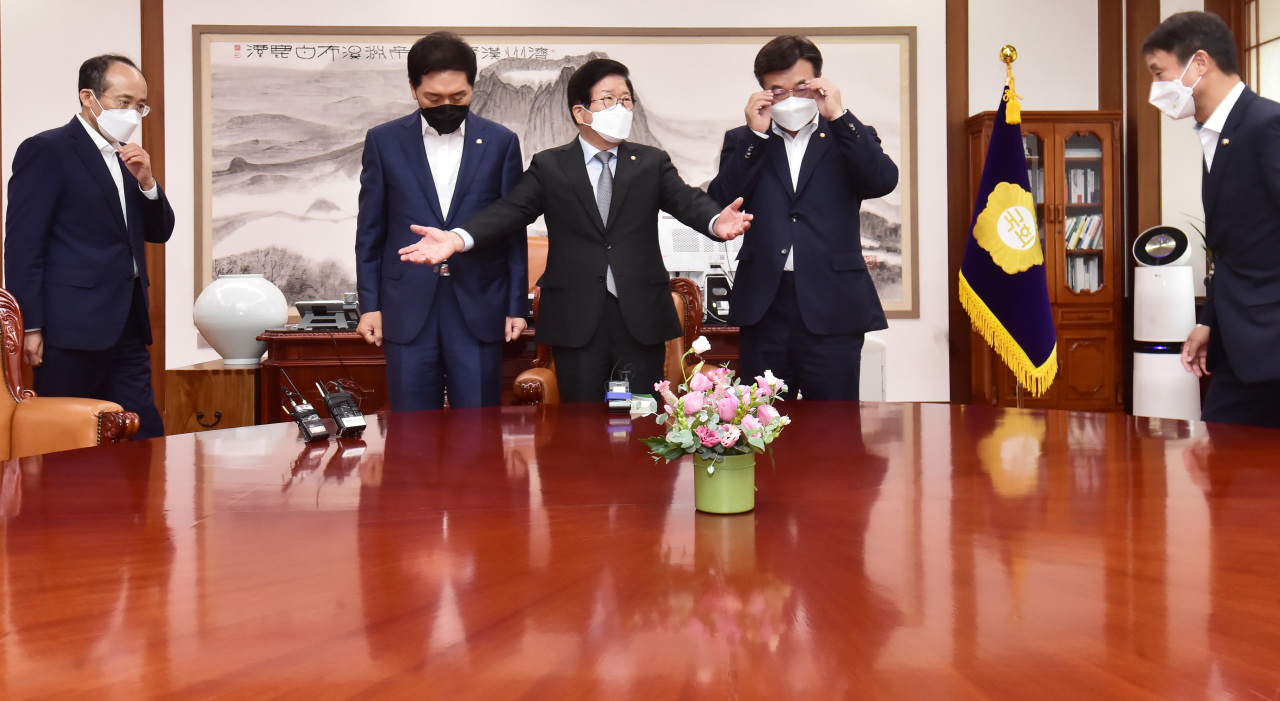 |
National Assembly Speaker Park Byeong-seug (center) holds a meeting with Democratic Party of Korea Floor Leader Rep. Yun Ho-jung (second from right) and People Power Party Floor Leader Rep. Kim Gi-hyeon (second from left) on Wednesday. (Yonhap) |
South Korea’s National Assembly postponed a plenary meeting scheduled for Wednesday, preventing the ruling party from passing two controversial bills that have drawn fierce protests from opposition lawmakers.
Early Wednesday, National Assembly Speaker Park Byeong-seug notified the political party floor leaders that the plenary meeting scheduled later in the day would be postponed, since bills should not go through two legislative stages on the same day.
At around 4 a.m. Wednesday, a controversial bill on “fake news” passed the Legislation and Judiciary Committee under the lead of the ruling Democratic Party -- the final stage before it is put to a final plenary vote. If it passes in the plenary session, journalists and media outlets will be penalized for producing news that is deemed fake.
The proposed revision to the Act on Press Arbitration and Remedies, Etc. for Damages Caused by Press Reports has passed almost seamlessly through all but the last stage in the legislative process. The ruling party has a majority on almost all parliamentary committees.
The bill, which the ruling party has defended as a way to protect the public from misinformation, is fiercely opposed by opposition lawmakers and the media. Detractors say it is a means to curb criticism of the ruling party ahead of the upcoming elections.
While the bill would come into effect in March, after the presidential election, its passage would still inhibit media companies from publishing critical reports, they argue, and in so doing would seriously undermine press freedom.
Since the bill couldn’t be passed Wednesday, the ruling and opposition parties are set to decide on a new date for a plenary meeting, which buys time for opposition lawmakers to restate their objections and propose changes to the bill.
Opposition lawmakers also gained time to negotiate details of a ruling party-led bill that would require surveillance cameras to be installed inside operating rooms to prevent medical malpractice.
Doctors and lawmakers from the main opposition People Power Party opposed the bill, saying surveillance could influence surgical procedures and result in leaks of personal data.
The bill states that hospitals must video-record any surgical procedure at the request of a patient or a patient’s guardian if the operation requires general anesthesia. The video footage has to be saved for at least 30 days in case of a legal dispute.
That legislative proposal also passed the Legislation and Judiciary Committee on Wednesday morning. As with the media bill, it was deemed inappropriate to put this one to a final vote the same day.
Yet it is unclear whether the opposition bloc can sway the ruling party’s decision when the Democratic Party controls 60 percent of parliament’s 300 seats -- more than enough to pass any bill on its own.
It has already been warned that the ruling bloc will push forward with both bills, having argued that the changes are essential to protect average people. Throughout the legislative process, the opposition bloc could do no more than stage protests and issue statements denouncing the bills.
By Ko Jun-tae (
ko.juntae@heraldcorp.com)




![[Today’s K-pop] Blackpink’s Jennie, Lisa invited to Coachella as solo acts](http://res.heraldm.com/phpwas/restmb_idxmake.php?idx=644&simg=/content/image/2024/11/21/20241121050099_0.jpg)



